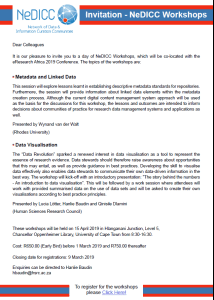NeDICC 1 August 2018 Machine Actionable DMP
Dear colleagues
You are invited to attend the NeDICC 1 August 2018 Machine-Actionable Data Management Plan Workshop, at the CSIR Knowledge Commons in Pretoria. NeDICC brings you Sarah Jones from the UK Digital Curation Centre, to present and facilitate a workshop Data Management Plans (DMP)and harnessing technology for DMP ease and efficiency.
Date: 1 August 2018
Venue: CSIR Knowledge Commons in Pretoria
Time: 07:30 for 08:00 to 16:00
Cost: ZAR 1000-00 p/p (Payment details to follow registration for event.)
General enquiries: Johann van Wyk, Niklas Zimmer and Fatima Darries
Register for attendance at : https://goo.gl/forms/tnMhcAj2RQ45qVi43
Please note that there are only 50 places.
Please share this notice to those at your institution who would benefit from learning about a machine actionable Data Management Plan. Librarians, knowledge management workers, data curators, researchers, ICT colleagues and others interested are invited to register for this workshop.
Data Management Plans (DMPs) are becoming commonplace across the globe, but opportunities are being missed to make the best use of the data and truly support researchers’ practices. The current manifestation of a DMP—a static pdf/doc/txt file created before a project even begins—only contributes to the perception that they are an annoying administrative exercise. What they really are is an integral part of research practice since today most research (across all disciplines) involves data, code, and other digital components. So can we reimagine DMPs in this context?
This workshop will address ideas for making DMPs machine-actionable and integrating them with other tools and services to embed the DMP in existing research workflows. Brainstorming and discussion sessions will give participants an opportunity to define and prioritise use cases that connect the DMP to support services and make the best use of the data.
Presenter: Sarah Jones is Associate Director at the Digital Curation Centre, a service to support the higher education sector with research data management. She coordinates work on the DCC’s Data Management Planning tool – DMPonline – and undertakes research on data policy and data management planning. She has written several articles and book chapters on these topics, and co-edited Delivering Research Data Management Services: fundamentals of good practice. Sarah provides advisory services, training and consultancy via the DCC and is involved in the FOSTER+, OpenAIRE and Research Data Alliance projects. She is also rapporteur on the European Commission’s FAIR Data Expert Group. Her work in a European context focuses primarily on training and data management planning to facilitate open science and compliance with Horizon 2020 requirements.
Programme:
| 7:30-8:00 |
Coffee/Tea |
|
| 8:00-8:05 |
Welcome and introductory remarks |
Niklas Zimmer |
| 8:05-8:15 |
Introduction on workshop aims and scope |
Sarah Jones |
| 8:15-9:00 |
An overview to Active DMPs |
Sarah Jones |
| 9:00-10:30 |
Activity: where do DMPs sit in the lifecycle and what systems could be integrated
- Mind map typical research workflows
- Highlight tools and systems that interface with DMPs and map these onto the workflow
- Consider which data could be fed automatically from these systems into DMPs or vice versa?
|
Sarah Jones and Facilitators |
| 10:30-11:00 |
Coffee/Tea |
|
| 11:00-12:15 |
Group discussion
- Describe / share the research workflows and where DMPs fit into them
- Which systems/services are relevant in the workflow and should connect with DMP tools?
- What can be automated and what will always have to be completed manually?
- How can we get more value from DMPs? (e.g. by open publishing, package DMPs together with data etc.)
|
Sarah Jones and Facilitators |
| 12:15-13:00 |
Overview of the DMP Roadmap project, and progress made |
Sarah Jones |
| 13:00-14:00 |
Lunch |
|
| 14:00-15:30 |
Defining use cases for machine-actionable DMPs
Groups will be allocated to one of the following topics and asked to work through scenarios to identify the priority use cases in the South African context.
- Institutional e.g. integration with CRIS systems, output tracking, calculating data storage requirements, costing data management…
- Repository e.g. alerts to forthcoming data deposits, sharing PIDs once data are published, making repository recommendations…
- Data discovery e.g. alerts to relevant data being published, using PIDs to link outputs and update CVs…
- Evaluation and monitoring e.g. notifications of data deposit / policy requirements being met, structured questions and automated assessment…
|
Sarah Jones & Facilitators |
| 15:30-16:00 |
Questions and closure |
|



